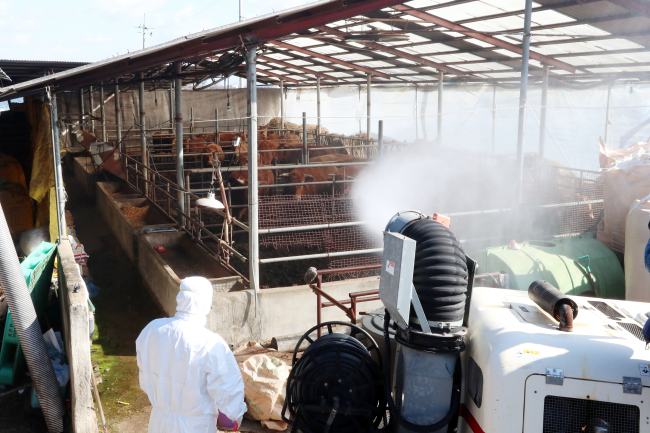Govt. issues travel ban of livestocks after foot-and-mouth disease outbreak
By KH디지털2Published : Feb. 6, 2017 - 16:04
South Korean authorities on Monday ordered a ban on the movement of all livestock and farm vehicles across the nation after an outbreak of foot-and-mouth disease at a dairy farm.
The Ministry of Agriculture, Food and Rural Affairs said some 220,000 farming households and vehicles are banned from moving from 6 p.m. Monday until Tuesday midnight, in order to contain the virus‘ spread. For the 30-hour standstill period, all vehicles will be cleaned and disinfected.
On Monday, a cow at a farm in Boeun County, 180 kilometers southeast of Seoul in North Chungcheong Province, was confirmed to have contracted the O-type, the most common type of foot-and-mouth disease here. All 195 cows raised in the farm were culled. The result confirmed the country’s first outbreak since March.
The Ministry of Agriculture, Food and Rural Affairs said some 220,000 farming households and vehicles are banned from moving from 6 p.m. Monday until Tuesday midnight, in order to contain the virus‘ spread. For the 30-hour standstill period, all vehicles will be cleaned and disinfected.
On Monday, a cow at a farm in Boeun County, 180 kilometers southeast of Seoul in North Chungcheong Province, was confirmed to have contracted the O-type, the most common type of foot-and-mouth disease here. All 195 cows raised in the farm were culled. The result confirmed the country’s first outbreak since March.

The ministry said that another cow farm in Jungeup in North Jeolla Province reported a suspected case.
Quarantine authorities said that it has taken measures to contain the suspected outbreak, stepping up the country’s foot-and-mouth watch level.
“The disease is unlikely to be widespread as it was one of the three types that the country have vaccinated,” said a ministry official Kim Kyung-gyu during a briefing, adding that it would immediately vaccinate another approximately 55,000 cows and pigs bred in the county.
Meanwhile, the government decided to expand the headquarters previously established to cope with the avian influenza outbreak, in order to deal with the foot-and-mouth disease as well.
The country has been struggling with rapidly spreading avian influenza since November last year, which led to culling nearly 33 million chickens and ducks and raising the country’s bird flu alert level to the highest for the first time.
Authorities are conducting an epidemiological survey on routes taken by workers and animals at the farm in question.
By Kim Da-sol (ddd@heraldcorp.com)
Quarantine authorities said that it has taken measures to contain the suspected outbreak, stepping up the country’s foot-and-mouth watch level.
“The disease is unlikely to be widespread as it was one of the three types that the country have vaccinated,” said a ministry official Kim Kyung-gyu during a briefing, adding that it would immediately vaccinate another approximately 55,000 cows and pigs bred in the county.
Meanwhile, the government decided to expand the headquarters previously established to cope with the avian influenza outbreak, in order to deal with the foot-and-mouth disease as well.
The country has been struggling with rapidly spreading avian influenza since November last year, which led to culling nearly 33 million chickens and ducks and raising the country’s bird flu alert level to the highest for the first time.
Authorities are conducting an epidemiological survey on routes taken by workers and animals at the farm in question.
By Kim Da-sol (ddd@heraldcorp.com)









![[K-pop’s dilemma] Time, profit pressures work against originality](http://res.heraldm.com/phpwas/restmb_idxmake.php?idx=644&simg=/content/image/2024/05/08/20240508050705_0.jpg&u=20240508171126)








![[Today’s K-pop] Stray Kids to drop new album in July: report](http://res.heraldm.com/phpwas/restmb_idxmake.php?idx=642&simg=/content/image/2024/05/09/20240509050659_0.jpg&u=)